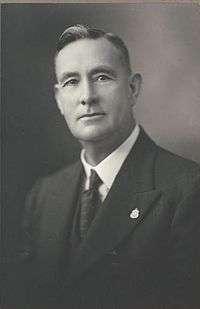Charles Latham
Sir Charles George Latham (26 January 1882 – 26 August 1968) was an Australian politician born in Hythe, Kent in England.[1]
Sir Charles Latham | |
|---|---|
 Charles Latham in the 1940s | |
| Member of the Western Australian Legislative Assembly for York | |
| In office 12 March 1921 – 7 October 1942 | |
| Preceded by | Harry Griffiths |
| Succeeded by | Charles Perkins |
| Deputy Premier of Western Australia | |
| In office 1930–1933 | |
| Premier | James Mitchell |
| Preceded by | John Willcock |
| Succeeded by | Alick McCallum |
| Leader of the Opposition (Western Australia) | |
| In office 1933–1942 | |
| Preceded by | Philip Collier |
| Succeeded by | Arthur Watts |
| Senator for Western Australia | |
| In office 8 October 1942 – 20 August 1943 | |
| Preceded by | Bertie Johnston |
| Succeeded by | Dorothy Tangney |
| Personal details | |
| Born | 26 January 1882 Hythe, Kent, England |
| Died | 26 August 1968 (aged 86) South Perth, Western Australia |
Biography
Latham became an orphan in early childhood when his parents Thomas Latham (a coast guard) and Isabella (née Isum) died before the age of 8. Latham moved to New South Wales in Australia with his siblings in 1890 and married Marie Louisa von Allwörden on 24 June 1903 at Hay in the same state.[1]
In 1910, Latham moved to Western Australia to take up 1,000 acres (4.0 km2) of land at East Kumminin (now Narembeen), 286 kilometers (178 mi) east of Perth. In his early farming days, he was unsuccessful, but was not deterred by the 1914 drought and owned 2,000 acres (8.1 km2) of land in 1921 when he entered parliament.[1]
In 1916 Latham enlisted in the entirely volunteer-run First Australian Imperial Force and was promoted to the rank of Corporal in January 1917. He was wounded in France in March 1918. Latham was promoted Sergeant in 1919 and was discharged in May of that year.[1]
Political career
Latham became the Country Party (now National Party) candidate for the Legislative Assembly seat of York in 1921 and became a MLC following this endorsement. Before the First World War Latham was a member of the Bruce Rock Road Board before the war, but upon his return to Australia he became the chairman of the Narembeen Road Board in 1924. In 1930 Latham became the parliamentary leader of the Country Party and fervently rallied for farmers' rights. Later that year he joined the Party with the Nationalist Party and served as deputy Premier of Western Australia under James Mitchell from 1930 to 1933. From 1933 onwards, Latham was the Leader of the Opposition until 1942, when he resigned to fill a vacancy in the Australian Senate but lost the 1943 election. Latham then returned to Parliament in 1946 to serve as a Member of the Legislative Council, became Minister for Agriculture in 1952–53 and retired in 1960, after another two years as the President of the Legislative Council.
Latham died on 26 August 1968 and was cremated at Karrakatta Cemetery.[1][2]
See also
- Leader of the Opposition (Western Australia)
- National Party of Western Australia
References
- "Latham, Sir Charles George". Australian Dictionary of Biography. Retrieved 10 October 2007.
- Black, David; Bolton, Geoffrey (2001). Biographical Register of Members of the Parliament of Western Australia, Volume One, 1870–1930 (Revised ed.). Parliament House: Parliament of Western Australia. ISBN 0730738140.